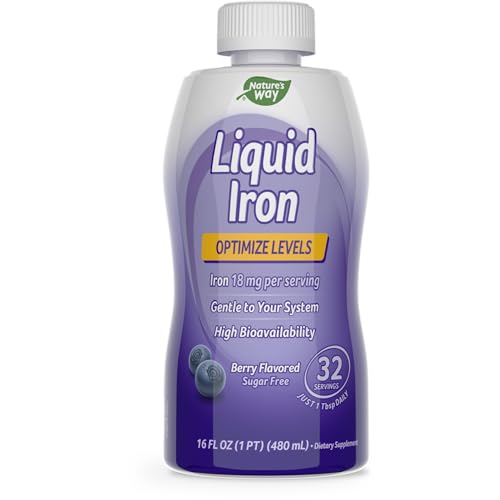
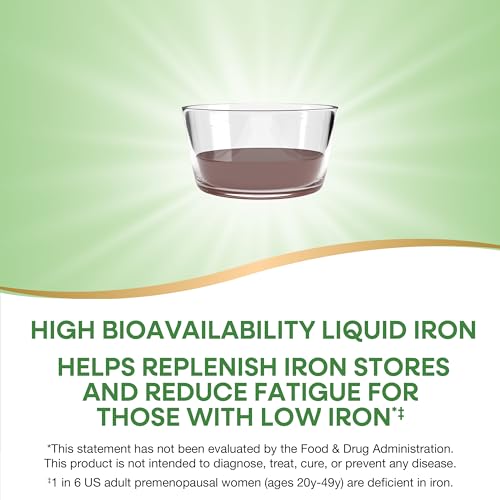
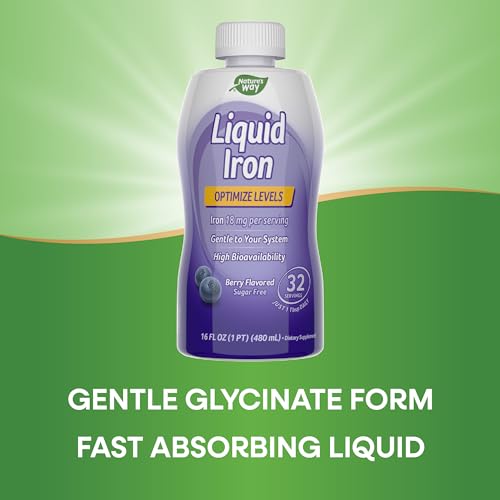
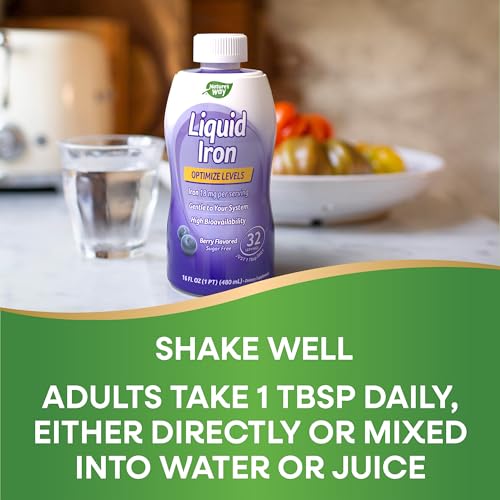
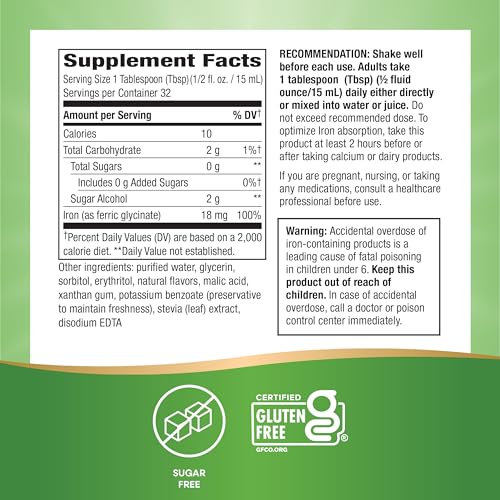
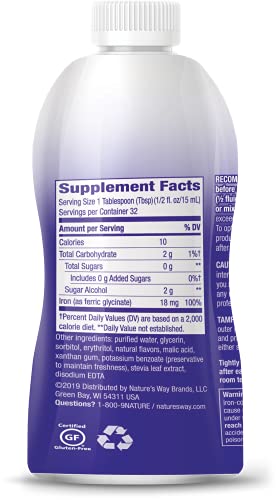
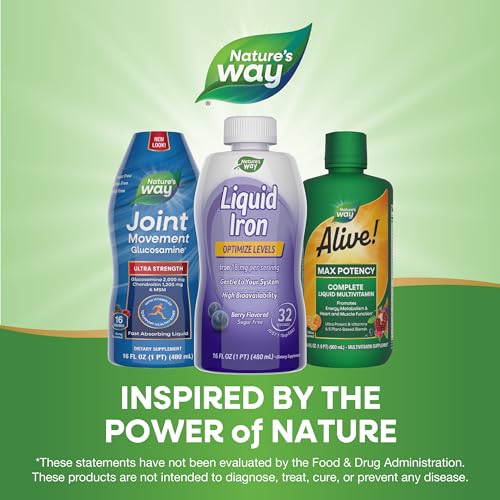
Nature's Way Liquid Iron - Restores Energy, Sugar-Free Berry Flavor, Gluten-Free - 16 Fl. Oz.


Malic Acid
High RiskMalic acid is a naturally occurring organic acid found in various fruits, particularly apples. It plays a role in the metabolic processes of living organisms and is commonly used as a flavoring agent, pH regulator, and preservative in food and cosmetic products.
Sustai Insights
Malic acid serves as an effective pH adjuster and flavor enhancer, contributing to the sensory profile of products. However, it may cause skin and eye irritation and has high use restrictions, limiting its application. Regulatory bodies have noted these concerns, leading to restrictions on its use in certain products. Overall, the ingredient is considered high risk due to these factors, necessitating careful usage and consideration of safer alternatives.
Vegetarian Glycerin
Low RiskVegetarian glycerin, also known as glycerol, is a colorless, odorless, and viscous liquid derived from plant sources. It is primarily used as a humectant, solvent, and emollient in various personal care products, helping to retain moisture and improve texture.
Sustai Insights
Vegetarian glycerin offers functional benefits as an effective humectant, promoting hydration and skin smoothness. It is biodegradable and typically sustainably sourced. Health risks associated with glycerin are low, with no significant concerns for carcinogenicity, allergens, or reproductive toxicity. Environmental risks are minimal, and it is not subject to major regulatory warnings. Overall, the risk level for this ingredient is low, making it a safe choice in formulations. Safe usage practices include ensuring proper concentrations in products, and alternatives such as propylene glycol exist but may have differing properties.
Potassium Benzoate
Low RiskPotassium benzoate is a potassium salt of benzoic acid, commonly used as a preservative in food and cosmetic products. It prevents microbial growth and extends shelf life, making it a popular choice in formulations requiring stability and safety against spoilage.
Sustai Insights
Potassium benzoate serves effectively as a preservative, helping to maintain product integrity. It is considered low risk regarding cancer, allergies, and reproductive toxicity, with no significant environmental concerns noted. Regulatory bodies have imposed minimal restrictions on its use. Safe practices recommend adhering to established concentration thresholds. Alternatives include sodium benzoate, which may offer similar benefits with comparable safety profiles. Overall, the ingredient is assessed as low risk.
Erythritol
Low RiskErythritol is a sugar alcohol used primarily as a low-calorie sweetener in various food and beverage products. It occurs naturally in some fruits and fermented foods. Erythritol provides sweetness without significant calories or raising blood glucose levels, making it a popular alternative to traditional sugars.
Sustai Insights
Erythritol offers functional benefits as a sweetener with low caloric content, providing a suitable option for sugar reduction. It is considered safe with low concerns regarding carcinogenicity, allergies, and reproductive toxicity. Environmentally, it is not recognized as a significant pollutant nor does it bioaccumulate. Regulatory status is favorable, with no current restrictions. Overall, the ingredient presents a low risk, making it a viable option for consumers seeking healthier alternatives.
Sorbitol
Low RiskSorbitol (glucitol) is a type of sugar alcohol used primarily as a sweetener and humectant in various food and cosmetic products. It is known for its moisture-retaining properties and is often found in sugar-free foods and personal care formulations.
Sustai Insights
Sorbitol serves effectively as a sweetener and humectant while being considered biodegradable and sustainably sourced. Health risks are low, with no significant concerns regarding carcinogenicity, allergies, or reproductive toxicity. Environmental assessments indicate minimal pollutant potential and low bioaccumulation. Regulatory bodies, including the FDA, have approved its use, but it is subject to specific guidelines. Overall, sorbitol presents a low risk profile, making it a suitable ingredient in food and cosmetic applications.
Xanthan Gum
Low RiskXanthan gum is a polysaccharide, a sugar-based compound produced by the fermentation of glucose or sucrose. It is commonly used as a thickening agent and stabilizer in various food and cosmetic products due to its ability to improve texture and prevent ingredient separation.
Sustai Insights
Xanthan gum serves effectively as a thickener and stabilizer, enhancing product texture and consistency. It is biodegradable and typically derived from renewable sources, supporting sustainability efforts. Health risks are minimal, with low concerns regarding carcinogenicity, allergies, and reproductive toxicity. Environmental impact is similarly low, posing no significant hazards. Regulatory agencies, including the FDA, regard it as safe for use, with no significant restrictions. Overall, xanthan gum is assessed as low risk, making it a suitable ingredient in formulations.
Disodium Edta
Low RiskDisodium EDTA (ethylenediaminetetraacetic acid) is a chelating agent commonly used in cosmetics and personal care products to bind metal ions and enhance product stability. It helps prevent the deterioration of formulations by minimizing the effects of trace metals, thus improving the overall efficacy and shelf life of the product.
Sustai Insights
Disodium EDTA serves as an effective stabilizer and preservative in various formulations, aiding in the prevention of product degradation. It is considered to have low health risks, with minimal concerns regarding carcinogenicity, allergies, or reproductive toxicity. Environmentally, it is not classified as a significant pollutant or bioaccumulative substance. Regulatory bodies, including the FDA, have noted its safe use in specified concentrations. Overall, the ingredient is assessed to have a low risk profile, with no major health or environmental concerns, making it a reliable choice for product formulation.
Iron
Low RiskIron is a mineral that plays a vital role in various biological processes, primarily as a component of hemoglobin in red blood cells, facilitating oxygen transport. It is commonly used in dietary supplements and food fortification to address iron deficiency and support overall health.
Sustai Insights
Iron offers essential functional benefits, such as improving oxygen circulation and supporting metabolic processes. It is generally considered safe with low risks for carcinogenicity, allergenic potential, and reproductive toxicity. Regulatory bodies like the FDA do not impose significant restrictions on its use. However, excessive iron intake can lead to health risks, including toxicity. Environmentally, iron is not known to be a pollutant or bioaccumulative. Overall, iron is assessed as low risk, with safe usage practices advised, including monitoring intake levels. Alternatives for supplementation include dietary sources like spinach and legumes.
Vegetarian Glycerin
Low RiskVegetarian glycerin, also known as glycerol, is a colorless, odorless, and viscous liquid derived from plant sources. It is primarily used as a humectant, solvent, and emollient in various personal care products, helping to retain moisture and improve texture.
Sustai Insights
Vegetarian glycerin offers functional benefits as an effective humectant, promoting hydration and skin smoothness. It is biodegradable and typically sustainably sourced. Health risks associated with glycerin are low, with no significant concerns for carcinogenicity, allergens, or reproductive toxicity. Environmental risks are minimal, and it is not subject to major regulatory warnings. Overall, the risk level for this ingredient is low, making it a safe choice in formulations. Safe usage practices include ensuring proper concentrations in products, and alternatives such as propylene glycol exist but may have differing properties.
Potassium Benzoate
Low RiskPotassium benzoate is a potassium salt of benzoic acid, commonly used as a preservative in food and cosmetic products. It prevents microbial growth and extends shelf life, making it a popular choice in formulations requiring stability and safety against spoilage.
Sustai Insights
Potassium benzoate serves effectively as a preservative, helping to maintain product integrity. It is considered low risk regarding cancer, allergies, and reproductive toxicity, with no significant environmental concerns noted. Regulatory bodies have imposed minimal restrictions on its use. Safe practices recommend adhering to established concentration thresholds. Alternatives include sodium benzoate, which may offer similar benefits with comparable safety profiles. Overall, the ingredient is assessed as low risk.
Erythritol
Low RiskErythritol is a sugar alcohol used primarily as a low-calorie sweetener in various food and beverage products. It occurs naturally in some fruits and fermented foods. Erythritol provides sweetness without significant calories or raising blood glucose levels, making it a popular alternative to traditional sugars.
Sustai Insights
Erythritol offers functional benefits as a sweetener with low caloric content, providing a suitable option for sugar reduction. It is considered safe with low concerns regarding carcinogenicity, allergies, and reproductive toxicity. Environmentally, it is not recognized as a significant pollutant nor does it bioaccumulate. Regulatory status is favorable, with no current restrictions. Overall, the ingredient presents a low risk, making it a viable option for consumers seeking healthier alternatives.
Malic Acid
High RiskMalic acid is a naturally occurring organic acid found in various fruits, particularly apples. It plays a role in the metabolic processes of living organisms and is commonly used as a flavoring agent, pH regulator, and preservative in food and cosmetic products.
Sustai Insights
Malic acid serves as an effective pH adjuster and flavor enhancer, contributing to the sensory profile of products. However, it may cause skin and eye irritation and has high use restrictions, limiting its application. Regulatory bodies have noted these concerns, leading to restrictions on its use in certain products. Overall, the ingredient is considered high risk due to these factors, necessitating careful usage and consideration of safer alternatives.
Sorbitol
Low RiskSorbitol (glucitol) is a type of sugar alcohol used primarily as a sweetener and humectant in various food and cosmetic products. It is known for its moisture-retaining properties and is often found in sugar-free foods and personal care formulations.
Sustai Insights
Sorbitol serves effectively as a sweetener and humectant while being considered biodegradable and sustainably sourced. Health risks are low, with no significant concerns regarding carcinogenicity, allergies, or reproductive toxicity. Environmental assessments indicate minimal pollutant potential and low bioaccumulation. Regulatory bodies, including the FDA, have approved its use, but it is subject to specific guidelines. Overall, sorbitol presents a low risk profile, making it a suitable ingredient in food and cosmetic applications.
Xanthan Gum
Low RiskXanthan gum is a polysaccharide, a sugar-based compound produced by the fermentation of glucose or sucrose. It is commonly used as a thickening agent and stabilizer in various food and cosmetic products due to its ability to improve texture and prevent ingredient separation.
Sustai Insights
Xanthan gum serves effectively as a thickener and stabilizer, enhancing product texture and consistency. It is biodegradable and typically derived from renewable sources, supporting sustainability efforts. Health risks are minimal, with low concerns regarding carcinogenicity, allergies, and reproductive toxicity. Environmental impact is similarly low, posing no significant hazards. Regulatory agencies, including the FDA, regard it as safe for use, with no significant restrictions. Overall, xanthan gum is assessed as low risk, making it a suitable ingredient in formulations.
Disodium Edta
Low RiskDisodium EDTA (ethylenediaminetetraacetic acid) is a chelating agent commonly used in cosmetics and personal care products to bind metal ions and enhance product stability. It helps prevent the deterioration of formulations by minimizing the effects of trace metals, thus improving the overall efficacy and shelf life of the product.
Sustai Insights
Disodium EDTA serves as an effective stabilizer and preservative in various formulations, aiding in the prevention of product degradation. It is considered to have low health risks, with minimal concerns regarding carcinogenicity, allergies, or reproductive toxicity. Environmentally, it is not classified as a significant pollutant or bioaccumulative substance. Regulatory bodies, including the FDA, have noted its safe use in specified concentrations. Overall, the ingredient is assessed to have a low risk profile, with no major health or environmental concerns, making it a reliable choice for product formulation.
Iron
Low RiskIron is a mineral that plays a vital role in various biological processes, primarily as a component of hemoglobin in red blood cells, facilitating oxygen transport. It is commonly used in dietary supplements and food fortification to address iron deficiency and support overall health.
Sustai Insights
Iron offers essential functional benefits, such as improving oxygen circulation and supporting metabolic processes. It is generally considered safe with low risks for carcinogenicity, allergenic potential, and reproductive toxicity. Regulatory bodies like the FDA do not impose significant restrictions on its use. However, excessive iron intake can lead to health risks, including toxicity. Environmentally, iron is not known to be a pollutant or bioaccumulative. Overall, iron is assessed as low risk, with safe usage practices advised, including monitoring intake levels. Alternatives for supplementation include dietary sources like spinach and legumes.
Discover Nature's Way Liquid Iron, a delicious berry-flavored dietary supplement designed to help boost your iron levels effortlessly. With 100% of your daily value of iron in just one tablespoon, this sugar-free, gluten-free liquid is perfect for those looking to enhance their energy and combat fatigue.
- Energy Boost: Quickly restores energy reserves and reduces fatigue, ideal for individuals with low iron levels.*
- Fast Absorption: Formulated with highly bioavailable iron glycinate, making it gentle on your digestive system.*
- Convenient and Tasty: Enjoy a great-tasting liquid that’s easier to consume than traditional tablets.
- Health-Conscious Ingredients: Contains no added sugars or gluten, ensuring a healthy choice for all dietary needs.
- Versatile Use: Mix it into your favorite juice or take it directly for a quick iron boost; perfect for daily wellness routines.
This supplement not only supports your health but also aligns with eco-friendly practices, making it a responsible choice for the planet-conscious consumer.
Subscribe & Save with Sustai
- Best Price Guarantee: Always enjoy the lowest prices on sustainable home essentials.
- No Surprises: We’ll notify you before shipping. No hidden fees, ever.
- You’re in Charge: Change, pause, or cancel your subscription anytime with ease.
- Eco-Friendly Deliveries: Our grouped shipments mean less packaging and lower emissions.
Join us on a sustainable journey. Special offers for a limited time! Prices and promotions may change.
Recommended Products
Discover Nature's Way Liquid Iron, a delicious berry-flavored dietary supplement designed to help boost your iron levels effortlessly. With 100% of your daily value of iron in just one tablespoon, this sugar-free, gluten-free liquid is perfect for those looking to enhance their energy and combat fatigue.
- Energy Boost: Quickly restores energy reserves and reduces fatigue, ideal for individuals with low iron levels.*
- Fast Absorption: Formulated with highly bioavailable iron glycinate, making it gentle on your digestive system.*
- Convenient and Tasty: Enjoy a great-tasting liquid that’s easier to consume than traditional tablets.
- Health-Conscious Ingredients: Contains no added sugars or gluten, ensuring a healthy choice for all dietary needs.
- Versatile Use: Mix it into your favorite juice or take it directly for a quick iron boost; perfect for daily wellness routines.
This supplement not only supports your health but also aligns with eco-friendly practices, making it a responsible choice for the planet-conscious consumer.

You can have at most 2 Sustainable Steals products in your cart
Customer Reviews
Customers’ View
Customers express a positive sentiment towards the Liquid Iron Supplement, appreciating its effectiveness and gentle formula. Many users highlight that this supplement does not cause constipation, a common issue with traditional iron pills, making it easier for those with digestive sensitivities to incorporate iron into their diets. The pleasant berry flavor is also frequently mentioned, making the supplement more enjoyable to consume compared to tablets. Additionally, its sugar-free and gluten-free formulation aligns well with health-conscious values, allowing users to maintain their dietary preferences without compromise. Overall, customers find this product effective for boosting iron levels while being mindful of digestive health.
AI-generated from the text of customer reviewsThis product is rated 4.5 of 5.0 stars.
It has received 25 reviews.





